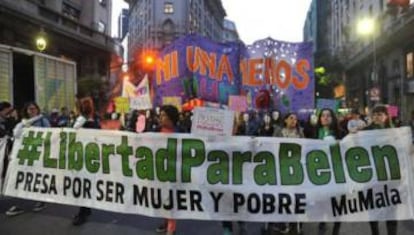Argentinean woman jailed for abortion acquitted after two years
Tucumán Provincial Supreme Court overrules eight-year sentence for aggravated homicide

In 2014, a 27-year-old woman from the northern Argentinean province of Tucumán went to her local hospital with a serious vaginal hemorrhage. The duty doctor diagnosed a spontaneous miscarriage, but the young woman, who has been named only as Belén, was subsequently accused of having disposed of the fetus in one of the hospital’s washrooms. She was arrested and later sentenced to eight years in jail for aggravated murder in a trial riddled with irregularities.

Belén spent more than two years behind bars until August, when the Tucumán Supreme Court ordered her release after a long-running nationwide campaign. Seven months later, the court has now acquitted her.
In overturning the lower tribunal’s decision, the provincial Supreme Court also highlighted the importance of professional confidentiality, the rights of women who have undergone an abortion and the right for women to be treated with dignity and not subjected to violence.
“Belén is very excited and very happy,” her lawyer, Soledad Deza, told EL PAÍS, saying that the ruling will set a precedent to prevent other women from being treated in the same manner. Belén not only saw the right to confidentiality owed to her as a patient who had suffered an abortion ignored, but was also sentenced without evidence being presented against her. The court found her guilty of the murder of a 32-week-old fetus found in a washroom in the hospital, although its advanced state of decomposition made it impossible to carry out a DNA analysis.
“This ruling provides justice twice over: for Belén and all other women who do not want to be mothers and that face spontaneous or voluntary abortion. I believe this ruling will encourage women to use the public health system because they now know they will not be arrested when they leave,” says Deza.
Belén is now considering whether to bring legal action against the Argentinean state. “There is a state responsibility for the time she has lost and for the violation of her rights that led to her losing her freedom and changed the course of her life,” adds Deza.
Around half a million women undergo privately carried out abortions each year in Argentina
The case made headlines in Argentina and abroad. The United Nations and Amnesty International joined local organizations in demanding Belén’s release. The sentence once again put the spotlight on abortion rights in Argentina, which are only granted in cases of rape and serious health risk to the mother. Despite being illegal in all other cases, around half-a-million women undergo privately performed abortions each year, while complications resulting from them are the main cause of maternal death there.
English version by Nick Lyne.
Tu suscripción se está usando en otro dispositivo
¿Quieres añadir otro usuario a tu suscripción?
Si continúas leyendo en este dispositivo, no se podrá leer en el otro.
FlechaTu suscripción se está usando en otro dispositivo y solo puedes acceder a EL PAÍS desde un dispositivo a la vez.
Si quieres compartir tu cuenta, cambia tu suscripción a la modalidad Premium, así podrás añadir otro usuario. Cada uno accederá con su propia cuenta de email, lo que os permitirá personalizar vuestra experiencia en EL PAÍS.
¿Tienes una suscripción de empresa? Accede aquí para contratar más cuentas.
En el caso de no saber quién está usando tu cuenta, te recomendamos cambiar tu contraseña aquí.
Si decides continuar compartiendo tu cuenta, este mensaje se mostrará en tu dispositivo y en el de la otra persona que está usando tu cuenta de forma indefinida, afectando a tu experiencia de lectura. Puedes consultar aquí los términos y condiciones de la suscripción digital.








































